Best Tea for Colds
Colds are caused by viruses, most commonly the rhinovirus. You may contract a cold through direct contact or by inhaling airborne particles.
Symptoms of a Cold:
- Runny or stuffy nose
- Sore throat
- Cough
- Congestion
- Sneezing
- Mild headache
- Mild body aches
Symptoms usually appear one to three days after exposure. Understanding these can help you manage your condition better.
Bestsellers
Duration:
A cold typically lasts 7-10 days. Rest and fluids can ease symptoms, but over-the-counter medications or home remedies like tea can also be effective.
When to See a Doctor:
- High fever
- Severe symptoms
- Persistent symptoms beyond 10 days
- Difficulty breathing
These signs may indicate a more serious condition requiring medical attention. Stay informed to take proper care of yourself.
Benefits of Tea for Cold Relief
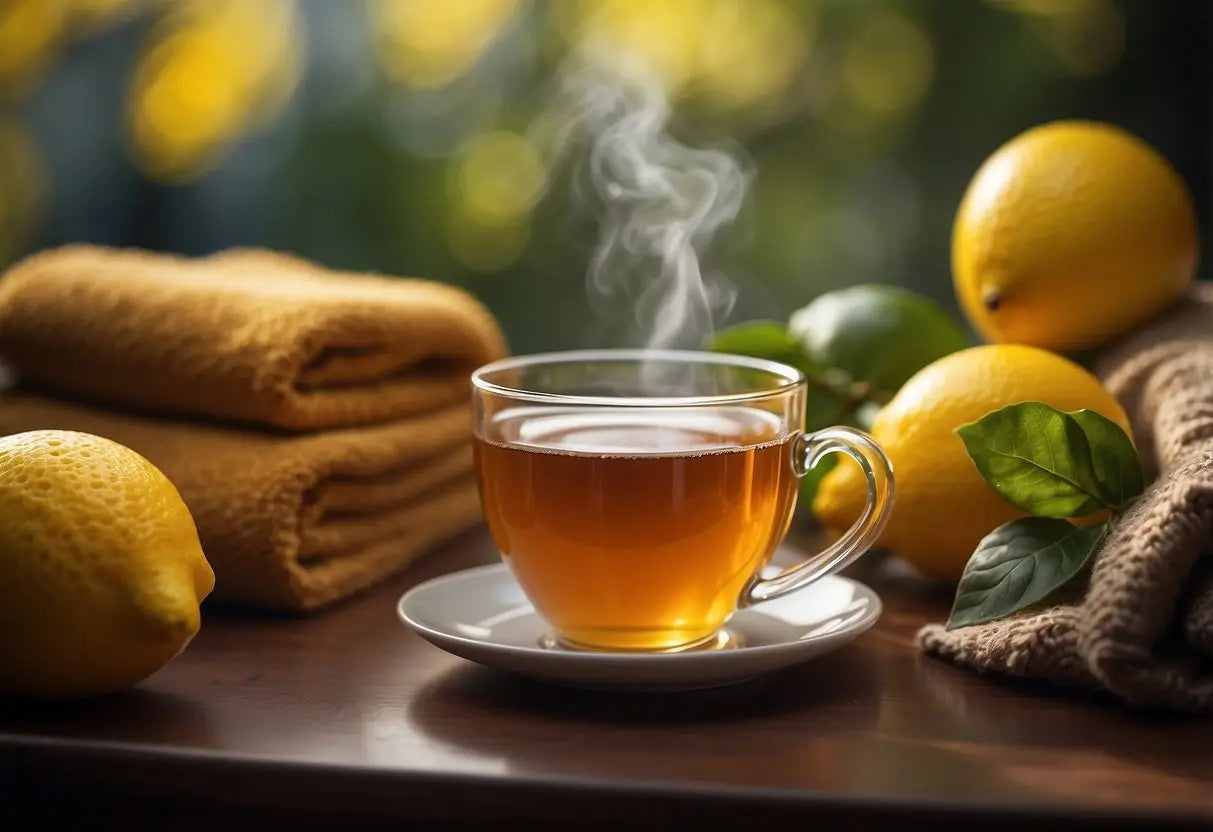
Drinking tea can help soothe sore throats. The warmth of the tea can be comforting and may help reduce throat irritation.
Certain teas contain antioxidants like catechins, which may support your immune system. Green tea is particularly high in these compounds.
Chamomile tea can be calming, helping you relax and possibly sleep better. Rest is crucial when you're fighting a cold.
Ginger tea can help ease nasal congestion. The spice can promote clear sinuses and help you breathe more freely.
Peppermint tea may act as a decongestant. Its menthol content can relieve symptoms of sinus congestion.
Honey and lemon added to tea can also provide additional health benefits:
- Honey has antimicrobial properties.
- Lemon offers vitamin C, which may boost your immune system.
Drinking fluids, including tea, helps keep you hydrated. Adequate hydration is important for your recovery.
Lao Ban Zhang
Herbal teas are generally caffeine-free, making them a good option any time of day. You won't have to worry about this affecting your sleep.
Types of Tea for Colds
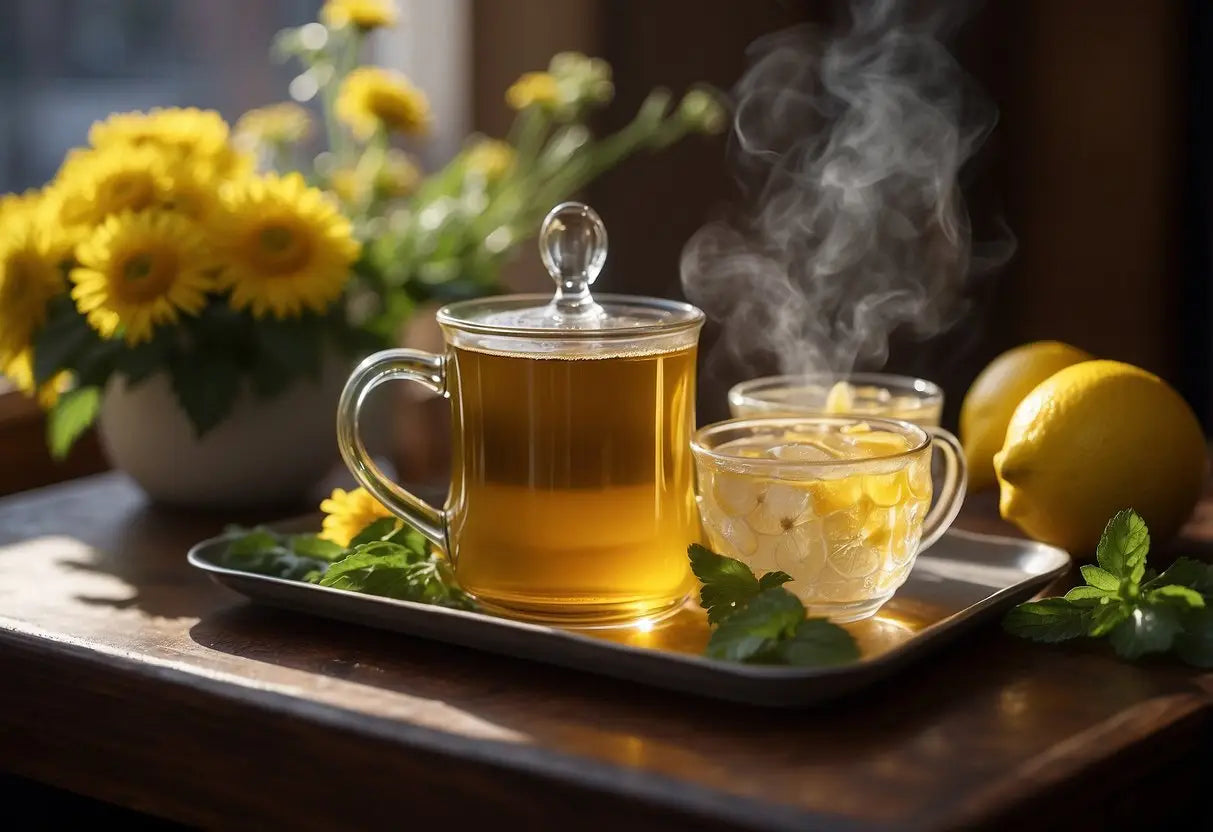
Choosing the right tea can boost your immune system and alleviate common cold symptoms. Each type of tea offers unique benefits that can help you feel better.
Peppermint Tea
Peppermint tea is known for its soothing properties. It acts as a decongestant, clearing nasal passages and easing breathing. The menthol in peppermint also has a cooling effect on the throat, reducing soreness. Drinking peppermint tea can alleviate headaches and reduce fever due to its cooling properties. Besides, it contains antioxidants that bolster your immune system.
Ginger Tea
Ginger tea is a powerful remedy for colds. It has anti-inflammatory and antioxidant properties that help in reducing inflammation and boosting immunity. Ginger can soothe a sore throat and relieve congestion. A warm cup of ginger tea also aids in digestion, which can be beneficial if your cold is accompanied by nausea.
Chamomile Tea
Chamomile tea offers calming effects that can help you sleep better, which is crucial when fighting a cold. It has anti-inflammatory and antioxidant properties to reduce swelling and fight infections. Drinking chamomile tea can also soothe sore throats and ease sinus congestion by reducing inflammation in the respiratory tract.
Echinacea Tea
Echinacea tea is renowned for its immune-boosting effects. Drinking echinacea tea regularly can help prevent colds or reduce their duration and severity. Its antiviral and anti-inflammatory qualities make it effective against symptoms like sore throat, runny nose, and fever. This tea also supports your body’s natural defense system.
Green Tea
Green tea is rich in antioxidants, particularly catechins, which have antiviral and antibacterial properties. These compounds help your body fight off colds by reducing inflammation and boosting immune response. Green tea can soothe a sore throat and clear nasal congestion. Additionally, it has a slight caffeine content that can help improve your energy levels.
Elderberry Tea
Elderberry tea is packed with vitamins and antioxidants which help strengthen your immune system. It’s known for its ability to reduce cold symptoms and shorten their duration. Elderberry has anti-inflammatory and antiviral properties that can alleviate a sore throat, congestion, and body aches. It also supports respiratory health, making it easier to breathe.
Thyme Tea
Thyme tea is effective in treating respiratory issues related to colds. It has antimicrobial and antiviral properties that help clear infections. Thyme tea can alleviate coughs, reduce nasal congestion, and soothe sore throats. It also aids in relieving muscle aches and pains that often accompany a cold.
Licorice Root Tea
Licorice root tea is known for its soothing effects on the throat and its ability to reduce inflammation. It has antiviral and antibacterial properties that help fight off colds. Drinking licorice root tea can relieve coughing, clear mucus, and reduce nasal congestion. It also supports adrenal health, which can help reduce stress and improve overall recovery.
How Tea Can Alleviate Cold Symptoms

Tea has compounds that can help ease cold symptoms.
Warmth and Comfort
Drinking warm tea can soothe a sore throat. The heat helps to clear nasal passages, making it easier for you to breathe.
Hydration
Staying hydrated is crucial when you have a cold. Tea aids in keeping you hydrated, which can thin mucus and relieve congestion.
Herbal Benefits
Peppermint Tea: Contains menthol, which can help open nasal passages.
Ginger Tea: Known for its anti-inflammatory properties. It can reduce throat pain and help with nausea.
| Tea Type | Benefit |
|---|---|
| Peppermint | Opens nasal passages |
| Ginger | Reduces throat pain |
| Chamomile | Improves sleep quality |
Chamomile tea can help you sleep better, which is important for recovery. It has a mild sedative effect, promoting relaxation.
Antioxidants
Tea is rich in antioxidants. These can help strengthen your immune system. Green tea, in particular, is high in catechins, which have antiviral properties.
Honey and Lemon
Adding honey and lemon to your tea can enhance its benefits. Honey has antibacterial properties and can coat a sore throat. Lemon provides a vitamin C boost, which is known to support immune function.
Tea can be a helpful tool in managing your cold symptoms. Its warmth, hydration benefits, and herbal properties work together to provide relief.
Herbal Teas vs Non-Herbal Teas for Colds
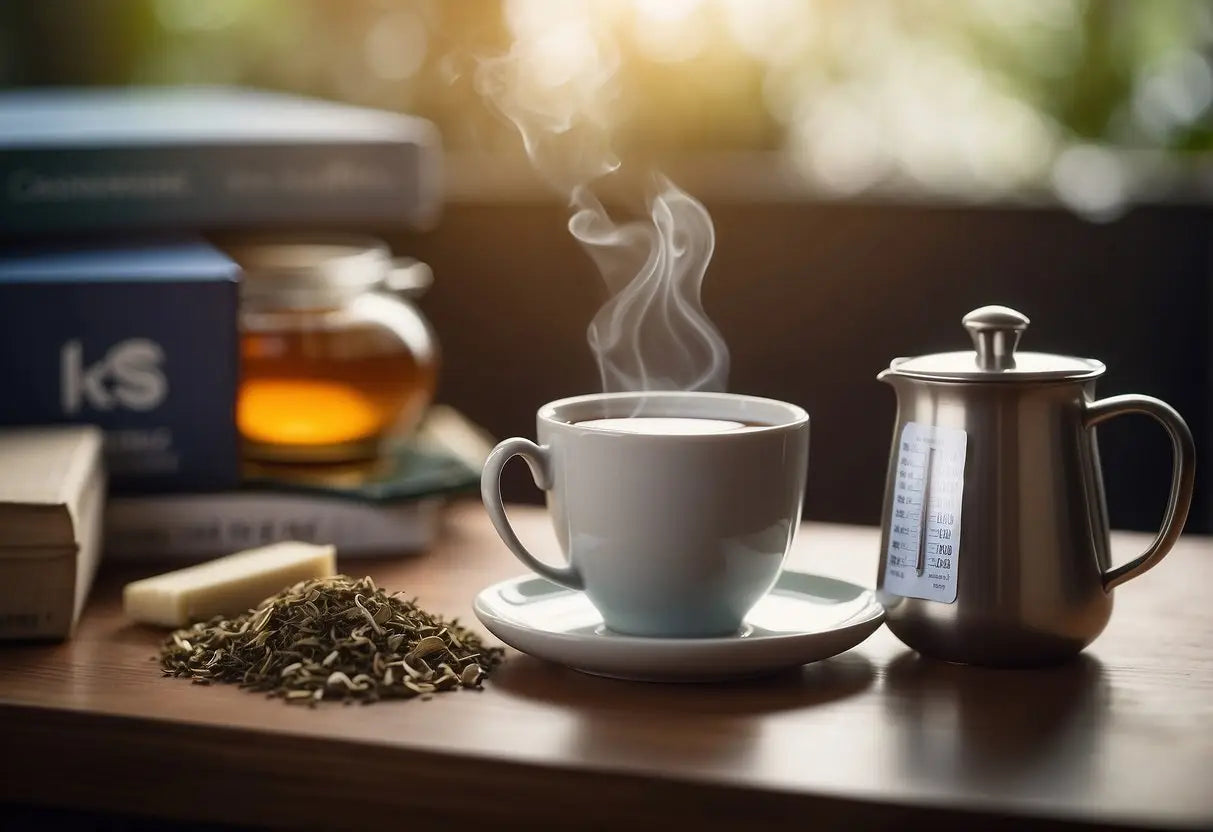
When you have a cold, both herbal and non-herbal teas can offer relief. Each type of tea has its own benefits.
Herbal teas:
- Ginger tea: Known for its anti-inflammatory properties, it can soothe sore throats.
- Peppermint tea: Helps clear nasal congestion.
- Chamomile tea: Promotes relaxation and better sleep.
Herbal teas are generally caffeine-free, making them ideal for evening consumption.
Non-herbal teas:
- Black tea: Contains antioxidants and can boost your immune system.
- Green tea: Rich in polyphenols, it fights infections effectively.
- White tea: Less processed, retains most antioxidants.
Non-herbal teas often contain caffeine, providing a mild energy boost.
Consider your symptoms and personal preferences when choosing between herbal and non-herbal teas.
The Role of Antioxidants in Cold Recovery
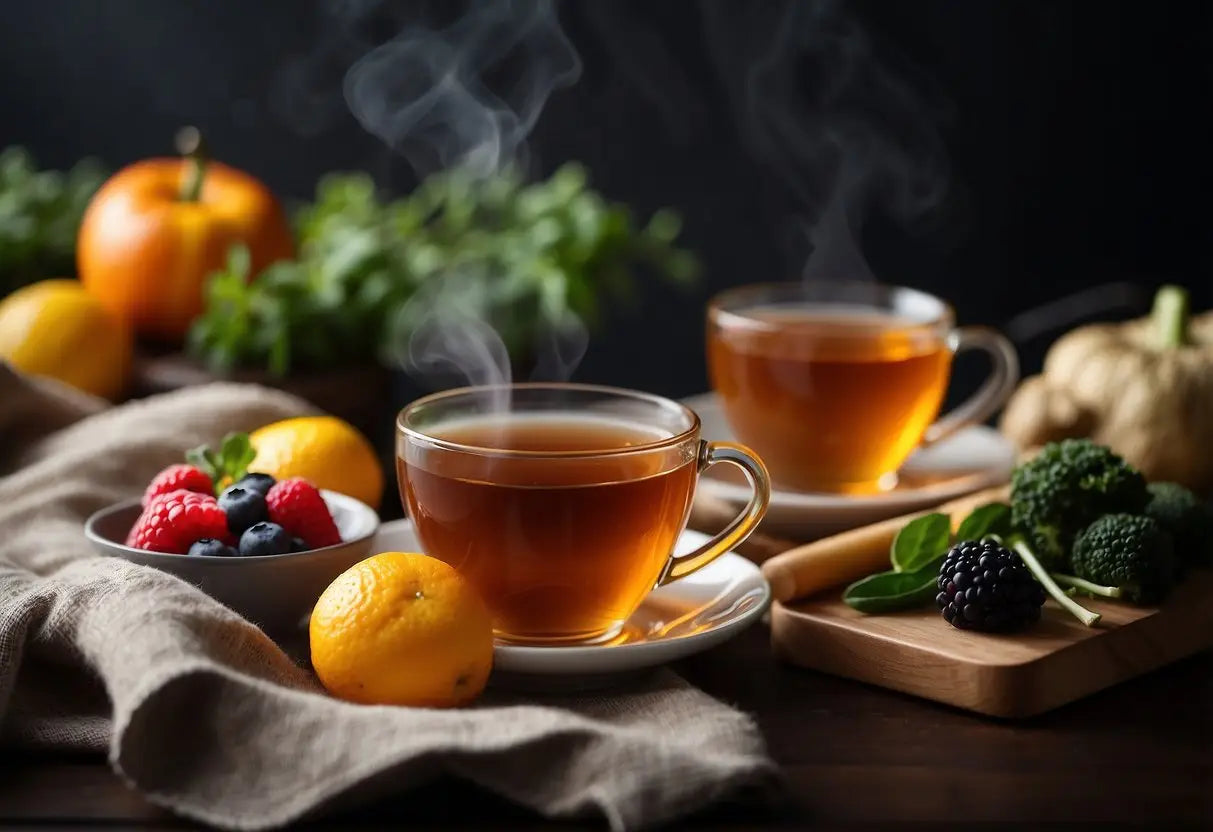
Antioxidants play a key role in strengthening your immune system. They help neutralize harmful free radicals in your body.
During a cold, your body produces more free radicals. These can cause damage to cells and tissues.
Tea is a great source of antioxidants like polyphenols, flavonoids, and catechins.
Benefits of Antioxidants:
- Boost Immune Function: Helps your immune system fight off the cold virus.
- Reduce Inflammation: Decreases swelling and inflammation in your throat and nasal passages.
- Speed Up Recovery: Helps repair tissues damaged by the cold virus.
Different types of tea contain varying levels of antioxidants. Green tea is particularly rich in catechins. Black tea is known for its high flavonoid content.
Including antioxidant-rich teas in your diet can significantly aid in cold recovery. You might find that drinking tea not only soothes your throat but also helps you bounce back quicker.
Remember to choose teas that are high in these beneficial compounds for the best results.
Preparing the Perfect Cup of Tea for Colds
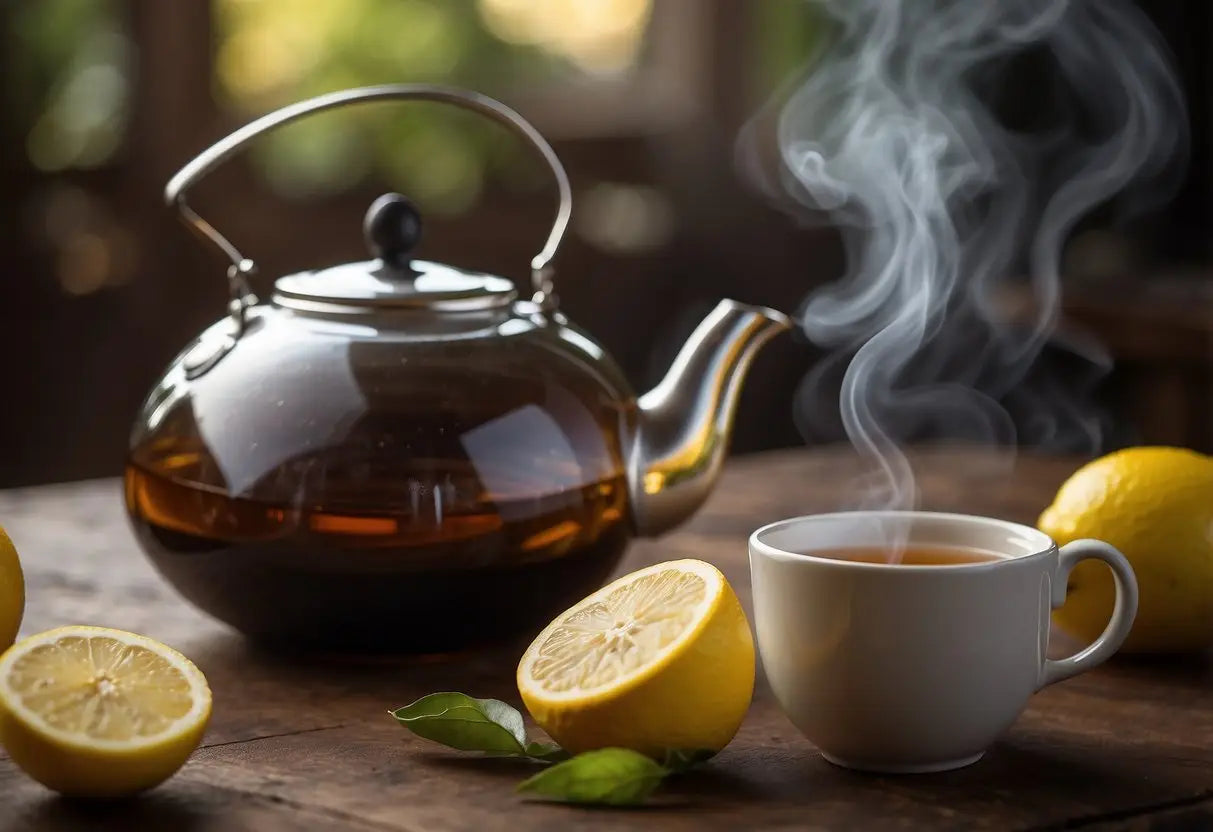
To prepare a comforting cup of tea for a cold, you'll need fresh, high-quality ingredients. Use filtered water; it enhances the tea's flavor. A clean kettle is essential to avoid any residual tastes.
Ingredients
- 1 cup of filtered water
- 1 teaspoon of loose tea leaves or 1 tea bag
- Optional: honey, lemon, ginger, or cinnamon
Steps
- Boil the filtered water in a clean kettle until it reaches a rolling boil.
- Place the loose tea leaves (or tea bag) in a teapot or cup.
- Pour the boiling water over the tea leaves or tea bag.
- Steep for about 5-7 minutes.
- Strain the leaves if using loose tea.
Enhancements
- Honey: Adds natural sweetness and is soothing for the throat.
- Lemon: Provides Vitamin C and a refreshing taste.
- Ginger: Offers anti-inflammatory properties.
- Cinnamon: Enhances flavor and has potential antiviral benefits.
Experiment with these additions to find the perfect blend for your needs.
Additional Natural Remedies to Combine with Tea
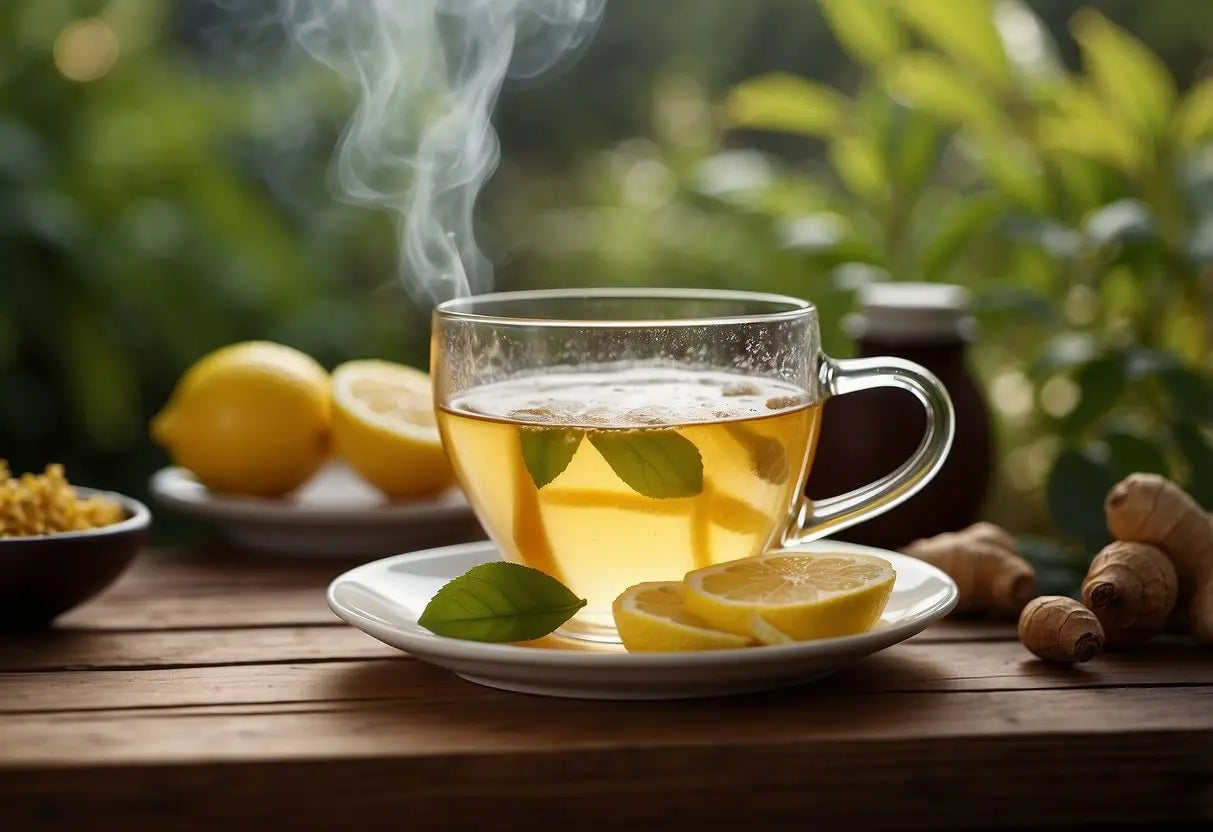
Honey
Honey offers soothing relief for sore throats. Add a teaspoon to your tea. It also has antimicrobial properties.
Lemon
Lemon provides a boost of vitamin C. Squeeze a slice into your tea. It's known to help support your immune system.
Ginger
Ginger can help ease nausea. A few fresh slices or powdered ginger added to your tea can offer relief. It's also known for its anti-inflammatory benefits.
Garlic
Garlic is known for its immune-boosting properties. Add minced garlic to herbal teas if you can tolerate the taste. Alternatively, consider garlic supplements.
Mint
Mint has a calming effect on the stomach. You can add fresh mint leaves directly into your tea. It also helps clear nasal passages.
Eucalyptus
Eucalyptus is effective for congestion relief. Steep eucalyptus leaves in boiling water along with your tea. Inhale the steam for additional benefit.
Cinnamon
Cinnamon provides a warming effect and has antimicrobial properties. Add cinnamon sticks or ground cinnamon to your tea. It enhances the flavor while offering health benefits.
Turmeric
Turmeric has powerful anti-inflammatory properties. Mix a small amount of turmeric powder into your tea. Pair it with a pinch of black pepper to enhance absorption.
Garlic Honey Syrup
Combine garlic and honey to create a syrup. Mix minced garlic with raw honey. Take a spoonful with your tea to boost immune support.
Apple Cider Vinegar
Apple cider vinegar helps balance your body's pH. Add a teaspoon to your tea. It may help to soothe sore throats.
When to Consult a Doctor
If your symptoms persist for more than a week, it's important to seek medical advice. This could indicate that a more serious condition is developing.
A high fever above 102°F (38.9°C), especially if it doesn't reduce with over-the-counter medications, warrants a doctor's visit.
Breathing difficulties, such as shortness of breath or wheezing, require immediate medical attention.
If you experience severe headache or facial pain, it could be a sign of a sinus infection that needs professional treatment.
Severe Symptoms to Watch For:
- Persistent high fever
- Extreme fatigue
- Chest pain
- Persistent vomiting
For those with pre-existing conditions like asthma or diabetes, it's prudent to consult a doctor sooner, as your condition may complicate your cold symptoms.
Children and elderly adults are at higher risk for complications and should be evaluated by a healthcare provider if symptoms are severe or worsening.
Ignoring these signs can lead to complications. It's better to seek professional guidance early to prevent further issues.
← Older post Newer post →











